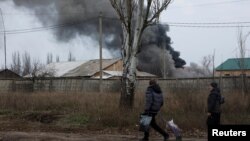ປະທານາທິບໍດີຣັດເຊຍ ທ່ານວລາດີເມຍ ປູຕິນ ໄດ້ປະກາດໃນວັນອັງຄານວານນີ້ວ່າ ປະເທດຈະຫ້າມການສົ່ງນ້ຳມັນອອກໄປສູ່ບັນດາປະເທດທີ່ເຫັນພ້ອມກັບການຈຳກັດລາຄານ້ຳມັນ ໂດຍບັນດາປະເທດຕາເວັນຕົກ ທີ່ມີຜົນບັງຄັບໃຊ້ໃນຕົ້ນເດືອນນີ້.
ອີງຕາມດຳລັດປະທານາທິບໍດີ ທີ່ໄດ້ເຜີຍແຜ່ຢູ່ໜ້າເວບໄຊຂອງລັດຖະບານ ແລະ ຢູ່ໜ້າເວບໄຊວັງເຄຣມລິນນັ້ນ “ການສະໜອງນ້ຳມັນຂອງຣັດເຊຍ ແລະພະລິດຕະພັນນ້ຳມັນໄປໃຫ້ໜ່ວຍງານຕ່າງປະເທດທີ່ຖືກຕ້ອງຕາມກົດໝາຍ ແລະ ສ່ວນບຸກຄົນທັງຫຼາຍແມ່ນໄດ້ຖືກຫ້າມ ຖ້າຫາກສັນຍາສຳລັບການສະໜອງໂດຍກົງ ຫລືບໍ່ໂດຍກົງ” ທີ່ວ່ານີ້ໃຊ້ຂອບເຂດຈຳກັດລາຄາ.
ດຳລັດປະທານາທິບໍດີດັ່ງກ່າວຖືກສະເໜີດັ່ງກັບການຕອບໂຕ້ໂດຍກົງຕໍ່ “ການກະທຳຕ່າງໆທີ່ບໍ່ເປັນມິດ ແລະຂັດກັບກົດໝາຍສາກົນ ໂດຍສະຫະລັດ ແລະຕ່າງປະເທດ ແລະບັນດາອົງການສາກົນທີ່ເຂົ້າຮ່ວມກັບເຂົາເຈົ້າ” ອີງຕາມລາຍງານຂອງອົງການຂ່າວຣອຍເຕີ.
ການຈຳກັດລາຄານ້ຳມັນ ໄດ້ມີການເຫັນພ້ອມກັນໃນຕົ້ນປີນີ້ ໂດຍກຸ່ມເຈັດປະເທດທີ່ຮວມມີ ການາດາ, ຝຣັ່ງ, ເຢຍຣະມັນ, ອິຕາລີ, ຍີ່ປຸ່ນ, ອັງກິດ ແລະ ສະຫະລັດ ພ້ອມທັງສະຫະພາບຢູໂຣບ. ມັນຈະຖືກບັງຄັບໃຊ້ໂດຍກຸ່ມ G-7 ປະເທດ, ສະຫະພາບຢູໂຣບ ແລະອອສເຕຣເລຍ ອີງຕາມອົງການຂ່າວຣອຍເຕີ.
ບໍ່ນານຫລັງຈາກຂໍ້ຕົກລົງໄດ້ບັນລຸ ໃນວັນທີ 2 ທັນວາ ທ່ານນາງ ເອີຊູລາ ວອນ ເດີ ເລເຢນ ປະທານຄະນະກຳມາທິການຢູໂຣບ ໄດ້ກ່າວວ່າ “ການຈຳກັດລາຄາມີຢູ່ສາມເປົ້າໝາຍ: ນຶ່ງ, ມັນຈະຂະຫຍາຍຜົນກະທົບຂອງມາດຕະການລົງໂທດຂອງພວກເຮົາ. ສອງ, ມັນຈະຫຼຸດລາຍໄດ້ຂອງຣັດເຊຍໄປໜ້າ ແລະ ສາມ, ໃນເວລາດຽວກັນ, ມັນຈະເຮັດໃຫ້ຕະຫຼາດພະລັງງານໃນໂລກໝັ້ນຄົງ.”
ແນວໃດກໍ່ຕາມ, ຣັດເຊຍ ໄດ້ກ່າວວ່າການຈຳກັດດັ່ງກ່າວຈະບໍ່ເປັນຜົນກະທົບຕໍ່ການປະຕິບັດງານທາງທະຫານຂອງຕົນໃນຢູເຄຣນ ແລະໄດ້ສະແດງຄວາມເຊື່ອໜັ້ນວ່າ ຈະພົບເຫັນບັນດາຜູ້ຊື້ຄົນໃໝ່ຕໍ່ພະລິດຕະພັນນ້ຳມັນຂອງຕົນ.
ຣັດເຊຍ ເຊິ່ງເປັນຜູ້ພະລິດນ້ຳມັນທີສອງໃຫຍ່ສຸດຂອງໂລກ ຫລັງຈາກຊາອຸດີ ອາຣາເບຍ, ກ່າວວ່າການຫ້າມຈະເລີ້ມມີຜົນບັງຄັບໃຊ້ຈາກວັນທີ 1 ກຸມພາ ຫາ ວັນທີ 1 ກໍລະກົດ.
ນອກນັ້ນໃນວັນອັງຄານວານນີ້ ລັດຖະທົນຕີຕ່າງປະເທດສະຫະລັດ ທ່ານແອນໂທນີ ບລິງເຄັນ ໄດ້ຂຽນຂໍ້ຄວາມລົງໃນທວິດວ່າ ສະຫະລັດ ຈະຢືນຢູ່ກັບ
ຢູເຄຣນ “ດົນເທົ່າທີ່ຈະດົນໄດ້.”
Russian President Vladimir Putin announced Tuesday that the country would ban any oil exports to countries that agreed to an oil price cap imposed by Western nations that took effect earlier this month.
According to a presidential decree published on a government portal and the Kremlin website, "The supply of Russian oil and oil products to foreign legal entities and individuals is prohibited if the contracts for these supplies directly or indirectly" are using a price cap.
The decree was presented as a direct response to "actions that are unfriendly and contradictory to international law by the United States and foreign states and international organizations joining them," Reuters reported.
The oil price cap was agreed to earlier this year by the Group of Seven nations, which include Canada, France, Germany, Italy, Japan, the United Kingdom and the United States, as well as the European Union. It will be enforced by the G-7 nations, the EU and Australia, Reuters reported.
Shortly after the agreement was reached December 2, Ursula von der Leyen, president of the European Commission, said, "This price cap has three objectives: First, it strengthens the effect of our sanctions. Second, it will further diminish Russia's revenues, and thirdly, at the same time, it will stabilize global energy markets."
Russia, however, has said the cap will not affect its military campaign in Ukraine and expressed confidence it will find new buyers for its oil products.
Russia, the world's second-largest oil exporter after Saudi Arabia, said the ban will be in effect from February 1 to July 1.
Also Tuesday, U.S. Secretary of State Antony Blinken tweeted that the U.S. would stand with Ukraine "for as long as it takes."





